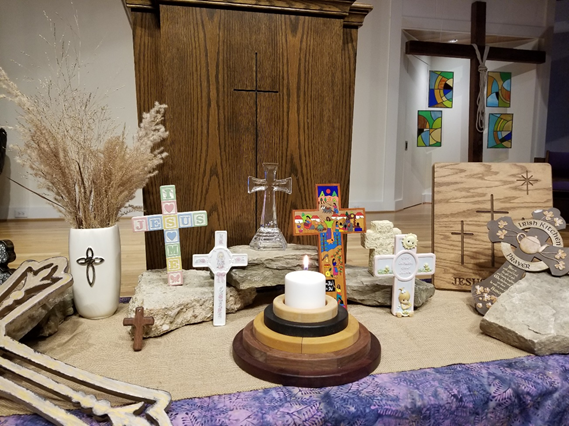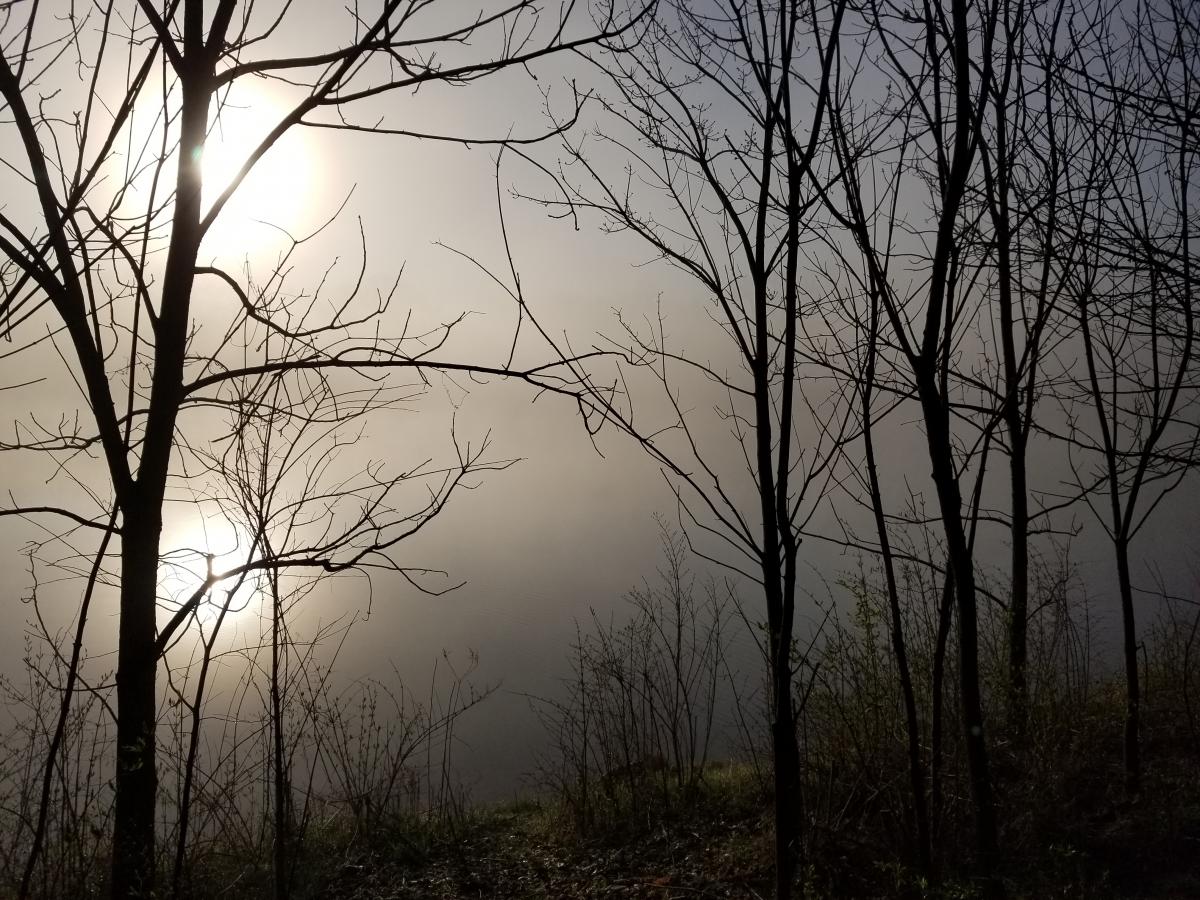The Cross and Being a Witness | Lent 6 | Palm Sunday | April 5
Opening Remarks | Joel Miller

Peace Candle/Welcome | Jen Cartmel & Maya Plessinger

As we meet today in spirit but not in person, we gather around these Sunday Meditations offered by members of the CMC community. Just as we light the Peace Candle to begin our worship, you are invited to light a candle for these Meditations. The flame joins us in spirit across distance, along with our sister church in Armenia, Colombia.
Call to Worship | Jen Cartmel

Hymn | Hold me God | Katie Graber

Children's Time | Debra Martin and family

Hymn | Hosanna, Loud Hosanna | Katie Graber

Prayers of the People (sent via email)
Pastoral Prayer | Mark Rupp

God, you are the one who weaves together the great tapestry of Creation, yet this morning many of us are feeling frayed, as if the world is coming unraveled and pulling us apart with it. In the moments when we feel undone, help us to remember that it is on the fringes that your presence can sometimes be the most clear. Give us courage to wave these tattered edges of ourselves along with our palm branches, knowing that you hear both our shouts of joy and our cries of lament.
We remember those in our community who have asked for prayer along with any unnamed prayers that weigh on our hearts…
[silence]
As we move from Palm Sunday toward Easter, grant us faith enough to face the pain of Good Friday, hope enough to brave the silence of Holy Saturday, and love enough to keep us always on the lookout for the dawning of new life. Amen.
Special music | It is Well | Katrina Cortes

Scripture | Matthew 27: 27-46, Common English Bible | Leo and Reuben Wyse

27 The governor’s soldiers took Jesus into the governor’s house, and they gathered the whole company of soldiers around him. 28 They stripped him and put a red military coat on him. 29 They twisted together a crown of thorns and put it on his head. They put a stick in his right hand. Then they bowed down in front of him and mocked him, saying, “Hey! King of the Jews!” 30 After they spit on him, they took the stick and struck his head again and again. 31 When they finished mocking him, they stripped him of the military coat and put his own clothes back on him. They led him away to crucify him.
32 As they were going out, they found Simon, a man from Cyrene. They forced him to carry his cross. 33 When they came to a place called Golgotha, which means Skull Place, 34 they gave Jesus wine mixed with vinegar to drink. But after tasting it, he didn’t want to drink it. 35 After they crucified him, they divided up his clothes among them by drawing lots. 36 They sat there, guarding him. 37 They placed above his head the charge against him. It read, “This is Jesus, the king of the Jews.” 38 They crucified with him two outlaws, one on his right side and one on his left.
39 Those who were walking by insulted Jesus, shaking their heads 40 and saying, “So you were going to destroy the temple and rebuild it in three days, were you? Save yourself! If you are God’s Son, come down from the cross.”
41 In the same way, the chief priests, along with the legal experts and the elders, were making fun of him, saying, 42 “He saved others, but he can’t save himself. He’s the king of Israel, so let him come down from the cross now. Then we’ll believe in him. 43 He trusts in God, so let God deliver him now if he wants to. He said, ‘I’m God’s Son.’” 44 The outlaws who were crucified with him insulted him in the same way.
45 From noon until three in the afternoon the whole earth was dark. 46 At about three Jesus cried out with a loud shout, “Eli, Eli, lama sabachthani,” which means, “My God, my God, why have you left me?”
Sermon | The Cross and Being a Witness | Joel Miller

First, a sermon prologue: I took this picture this week while on a run around Antrim Lake near our house. It was morning and the sunrise was finding its way through the dense fog over the lake, which mirrored the sun back through the fog. Once I get running I don’t like to stop, but this sight stopped me for a while. It was something I needed after a previous day that hadn’t gone well. Today’s sermon is about Being a Witness, and this image is one thing I witnessed this week and share now with you. Prologue over.

This story of Palm Sunday and Passion Week we regularly tell ourselves finds us in irregular circumstances. Regularly we’d be gathered in our church building. The children, exhibiting the full range of hesitant to exuberant, would be waving palm branches and laying them along the front of the sanctuary for us to ponder the rest of the service. We would sing, synchronized, and, generally, harmonized. We would sit next to someone not a part of our household and not think twice about it. After the service there would be talking, greeting people familiar and new. It’s the first Sunday of April, a cookie Sunday, so we’d head up to the fellowship hall, likely much more exuberant than hesitant. This would be followed by Sunday school, or coffee, or helping clean up the fellowship hall, or heading home or somewhere else. It would have been a fine service, a good morning, another Palm Sunday celebrated, another Passion week begun, like normal.
Needless to say, these are not normal times. We are, for the large part, child and adult, confined to our homes. Our calendars have been cleared of a host of activities, but life isn’t necessarily more simple. Within our congregation our experience of this time covers the full range of boredom and isolation, to a daily barrage of new problems to solve. It certainly doesn’t feel normal speaking a sermon into a recording device from home.
And so, as we enter Holy Week, each in our way, each from our own place, I invite us, I invite you to embrace the strangeness of these circumstances. What might this time allow you to see that you have not yet seen? To what might you give your attention that may have simply passed without notice had these been normal circumstances?
A theological word for this is witness. And we are each witnesses.
To what are you now present as a witness?
The gospel material for today and the week to come is extensive. Palm Sunday occurs five days before Jesus is crucified, yet the gospels devote nearly 30% of their space to this short window of time. As if bearing witness to these particular events, this final week of Jesus’ life and all that’s wrapped up in it, is of key importance to gospel itself.
In light of our present reality, of all this material, I’m especially drawn to two characters, actually two collective characters. If these gospel stories are committed to bearing witness to Jesus’ final days, then these two characters are witnesses within the gospel witness, each uniquely positioned in their witness.
The first could be easily ignored, and for the most part, is. It’s Jesus who reminds his listeners they’re even there in the first place. Present, but silent. Or so it seems.
We meet them during the events that take place on what we call Palm Sunday. As Luke tells it, after sending two of his companions ahead of him to fetch a colt, after they return with the colt and throw their cloaks over it, after Jesus gets on the colt and begins riding it down the Mount of Olives, toward Jerusalem, the whole multitude that surrounds him begins reciting the Psalm they would chant annually during their Passover pilgrimage on their way into the city: “Blessed is the king who comes in the name of the Lord! Peace in heaven, and glory in the highest heaven.”
The Pharisees are not amused with this piece of street theater Jesus has orchestrated. Perhaps because they’ve had it out for Jesus ever since he started pushing at the edges of what they believed was best for the people. Or, perhaps, since we know from other stories there were Pharisees sympathetic to Jesus, they are urging Jesus to keep things calm so as not to set off the alarms of the security operations of Rome which were there in full force during the Passover festival.
Luke writes: “Some of the Pharisees in the crowd said to him: “Teacher, order your disciples to stop.”
To which Jesus replies, “I tell you, if these were silent, the stones would shout out.”
And there’s the first of our witnesses. The stones.
Jesus wasn’t the first to draw attention to these seemingly inanimate objects and claim them as part of the peaceful reign of God.
The prophet Habakkuk, which, if you need a change of pace from social media during social distancing, makes for a good read, lived during a time when the Babylonians were taking over the known world. Habakkuk proclaimed that God had a secret weapon within the houses of the elite Babylonians. “Alas for you who get evil gain for your houses, setting your nest on high to be safe from the reach of harm. The very stones will cry out from the wall, and the plaster will respond from the woodwork.”
Long before Siri and Amazon Echo had the potential of eavesdropping on your household activities, the stones in the walls of the wealthy homes of ancient Babylon were apparently attuned to the cadences of justice, knew whether or not they had been enlisted to be part of a house that had exploited the poor. Even if nobody else was going to shout about it, the stones were bearing witness to it all.
Other prophets also called on the stones and the natural world as allies of God. That Micah 6:8 banner on the side of our church: “Do justice, love mercy, walk humbly.” draws from a prophetic statement that includes The Lord challenging the people of Israel to a lawsuit in which the people were to come and plead their case before the mountains. The same mountains had been witnesses to everything they had done, so, naturally, they’re in the courtroom of the Lord as witnesses.
Stones, it seems, are reliable friends of God. Jesus reminds the Pharisees that the crowds aren’t the only ones shouting their Hallelujah.
I wonder what all these old stones think of what’s going on in the world of us virus-vulnerable humans this past month. What do the stones know that we don’t?
And how can we be more like stones? Solidly holding our space, even in tumultuous times. A keeper of memory. Content with our place. Expressing our praise through the simple act of existence. A silent witness to all around us – with the occasional shout when circumstances call for it.
We meet our second group of witnesses at the end of this stretch of Jesus’ final days. The very end. And that’s a significant time to meet them. Because most everyone else has abandoned Jesus.
That scripture we heard details the awful ordeal Jesus underwent which culminated in his crucifixion. We’ve been contemplating the cross throughout Lent, and now here it is. Jesus is on the cross, where he will die. It includes Jesus crying out “My God, my God, why have you forsaken me?” It’s a line the commentator William Barclay called “the most staggering sentence in the gospel record.” Because Jesus is so closely identified with the incarnation of God, the thought of the Divine being forsaken by God does indeed stagger the mind.
Jesus may have felt abandoned by God on the cross, but he wasn’t entirely abandoned by people. Soon after Jesus cries out Matthew states: “Many women were also there, looking on from a distance; they had followed Jesus from Galilee and had provided for him. Among them were Mary Magdalene, and Mary the mother of James and Joseph, and the mother of the sons of Zebedee.” Luke introduces the women earlier in his gospel, letting us know they’re with Jesus all along and cluing us in on who’s financing this nonprofit not- yet- an- organization: These women “provided for them out of their own resources,” Luke says. They were invested. And they were all in. And they were there to the end in that God-forsaken place.
In Matthew they are watching from a distance. And in John they are right there, right near the cross. Close enough to talk with Jesus. And Jesus does talk with them. The disciple John is with them, and Jesus instructs him to take Jesus’ mother into his own household and care for her. Which he does.
These women and John do not save Jesus from the cross. But they are there as witnesses. They hold the space. In the diverse memory of the early church, they hold the space from a distance, looking on. And they hold the space nearby, close enough to be the final people Jesus speaks with before dying. They hold the loss, the grief, the sorrow.
It is not a coincidence that those who entered most deeply into this grief were the first to witness resurrection.
The stones are witnesses.
The women are witnesses.
And we are witnesses.
We are witnesses, again, of this story.
And we are witnesses, for the first time, of these new circumstances we are in.
There are sources of wonder waiting to be witnessed. Like Mary Oliver’s skunk cabbage. Like the sun rising out of a foggy lake. Sources of wonder that the stones know well and are waiting on us to pay attention to what they’ve been silently shouting as long as we’ve been walking upright.
And there are sources of grief and loss to be witnessed. We are facing a time of great unknown. And the novelty of everything being canceled will give way, if it hasn’t already, to the grief of the little and big deaths that we experience along the way. And when and if we do return to “normal,” there is no escaping other little and big deaths that are a part of being human.
Despite our social distance, we share in the act of witnessing. We join with the stones in being enlisted in God’s project of peace rather than Babylon and Rome’s project of domination. We gather with the women and grieve violence and death.
And through it, despite appearances, God is with us, and death will not have the last word.
Closing song | When Pain or Sorrow (Hold On) | Katie Graber

Christian Education | Interview with Shelly Beiting, City of Columbus Response to Homeless population during COVID-19 Pandemic | video 39m39s


